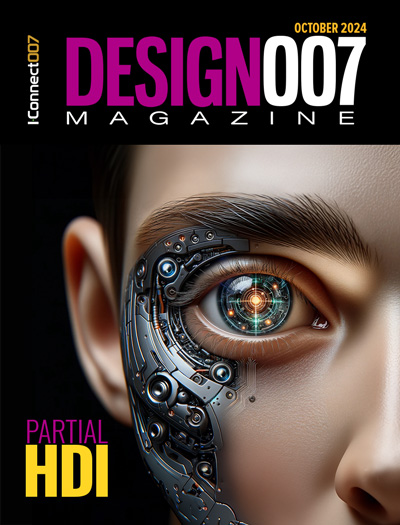-

- News
- Books
Featured Books
- design007 Magazine
Latest Issues
Current Issue
Advanced Packaging and Stackup Design
This month, our expert contributors discuss the impact of advanced packaging on stackup design—from SI and DFM challenges through the variety of material tradeoffs that designers must contend with in HDI and UHDI.

Rules of Thumb
This month, we delve into rules of thumb—which ones work, which ones should be avoided. Rules of thumb are everywhere, but there may be hundreds of rules of thumb for PCB design. How do we separate the wheat from the chaff, so to speak?

Partial HDI
Our expert contributors provide a complete, detailed view of partial HDI this month. Most experienced PCB designers can start using this approach right away, but you need to know these tips, tricks and techniques first.
- Articles
- Columns
Search Console
- Links
- Media kit
||| MENU - design007 Magazine
IPC Standards and Electronics Sustainability: More Than Meets the Eye
January 5, 2024 | Kelly Scanlon, IPC Lead Sustainability StrategistEstimated reading time: 1 minute
When we look at existing IPC standards, we see that most were created and intended to communicate and clarify expectations for superior quality, reliability, and consistency in electronics manufacturing. At first glance, their connection to sustainability is not obvious.
Yet as we continue to evaluate existing IPC standards against sustainability reporting best practices or requirements for companies in the electronics value chain, there are more than a dozen IPC standards that address important and relevant sustainability topics.
For example, training and education—a relevant and important industry sustainability topic covered by GRI standards—is represented in popular IPC standards, including IPC-A-610, Acceptability of Electronic Assemblies; IPC J-STD-001, Requirements for Soldered Electrical and Electronic Assemblies; and IPC-7711/21, Rework, Modification and Repair of Electronic Assemblies; and the certification programs built around these standards.
The GRI (Global Reporting Initiative) standards focus on the environmental, social, and economic impacts of a company in relation to sustainable development. They represent global best practices for reporting publicly. GRI is just one of four frameworks sustainability disclosures identified as a driver causing companies in the industry to disclose data and information on various sustainability topics and targets. A recent exploratory materiality study of dozens of industry sustainability reports revealed that GRI, along with SASB, TCFD, and CDP, was strongly preferred and most used of the four.
To read the rest of this article, which appeared in the fall issue of IPC Community, click here.
Suggested Items
IPC, FED Partner for New Design Conference in Vienna
12/12/2024 | Andy Shaughnessy, Design007 MagazineIPC and its German partner FED have teamed up to create a new PCB design conference in Vienna, Austria. The Pan-European Electronics Design Conference (PEDC) is scheduled for Jan. 29-30 at the NH Danube City hotel in Vienna. IPC’s Peter Tranitz, one of the show organizers, discussed how this new show came about, pointing out that, unlike many of the regional conferences in Europe, PEDC will host curated, peer-reviewed presentations, not promotional content or product pitches. Will PEDC become an annual event?
Happy’s Tech Talk #35: Yields March to Design Rules
12/12/2024 | Happy Holden -- Column: Happy’s Tech TalkUltra high density interconnect (UHDI) has many forms, structures, and alternatives, so capturing all the variations and reducing them to design rules has required some departures from traditional IPC design standards. In this column, I’ll be discussing the IPC UHDI design guidelines and standards. The fundamental question is: “Do you need HDI or microvias?”
Closing the Loop: iNEMI Workshop Addresses Circularity Challenges
12/09/2024 | Kelly Scanlon, IPC Lead Sustainability StrategistThe electronics industry faces increasing pressure from consumers and regulators to implement more circular design principles in their products. While some companies lead the way, many grapple with significant knowledge gaps. These include a lack of clear definitions for "circular economy" in the context of electronics, insufficient data, and inadequate training to apply circular principles effectively across product lifecycles. Additionally, there's a pressing need to understand the return on investment (ROI) and other potential incentives for implementing circular principles.
2024 IPC K-FEST: Shaping the Future of the Electronics Industry
12/06/2024 | IPCIPC K-FEST 2024, the 2nd annual IPC Korea Festival of Electronics Standards and Technology, was held in Seoul on October 29. The focus of this year’s event centered on the integration of Korea's technological leadership with international standards development.
The Training Connection Difference
12/04/2024 | Andy Shaughnessy, I-Connect007Bert Horner, president of The Test Connection, has recently launched The Training Connection, a new company that addresses critical training needs in test engineering and development. With a focus on essential methodologies like design for test (DFT) and IPC standards, the initiative promises to enhance the skills of professionals in the field. At PCB Carolina, Bert talked about the program, its positive reception, and the growing demand for practical, effective training solutions within the industry.


